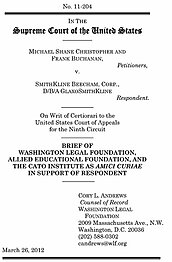Learn more about Cato’s Amicus Briefs Program.
Administrative agencies are accorded huge deference — too much deference — by the courts. Acting as police, prosecutor, judge, jury, and executioner, agencies increasingly act as a law unto themselves and do a majority of the federal government’s work. Through this arrangement, Congress is put in a win-win situation: the government can delegate decision-making to agencies and avoid political accountability. Because of these concerns, it is vitally important that courts’ deference to agencies not go too far. In Christopher v. SmithKline Beecham Corp., two former pharmaceutical sales representatives sued to recover overtime pay. The Fair Labor Standards Act, however, exempts “outside salesmen” from overtime requirements and for over 70 years a Department of Labor rule has broadly defined “outside salesman” to include those who perform any part of the work required to sell goods. Pharmaceutical companies, as well as many other businesses, have long organized their business practices around this rule. When former pharmaceutical employees brought a similar suit in the Second Circuit, the Secretary of Labor filed an amicus brief explaining that the rule would be thereafter changed not to exclude pharmaceutical employees. The Second Circuit deferred to this ad hoc rule change and held for the plaintiffs. In this case, however, the Ninth Circuit refused to defer to the Labor Department’s attempt to change a long-standing rule. Cato joined the Washington Legal Foundation and the Allied Educational Foundation on an amicus brief to advise the Court that the Ninth Circuit was, believe it or not, correct. As the Ninth Circuit said, an “about-face regulation, expressed only in ad hoc amicus filings” does not deserve even the broad deference already accorded to agencies. Moreover, we stress that, if such deference were allowed, it would encourage agencies to avoid the regular rulemaking procedures that allow affected parties to give “notice and comment” on the proposed changes. Administrative agencies should not be allowed any more leeway to increase their often unreviewable power.

This work is licensed under a Creative Commons Attribution-NonCommercial-ShareAlike 4.0 International License.


